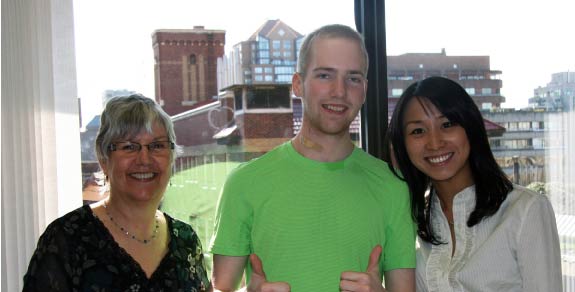 Heart transplant patient, Tyler Smith with Carol Imai (L), Patient Educator and Wynne Chiu (R), Clinical Coordinator at the Pre-Heart Transplant Clinic at St. Paul’s Hospital, shortly after receiving another post-transplant biopsy.
Heart transplant patient, Tyler Smith with Carol Imai (L), Patient Educator and Wynne Chiu (R), Clinical Coordinator at the Pre-Heart Transplant Clinic at St. Paul’s Hospital, shortly after receiving another post-transplant biopsy.
May 2011
“Research can only get better and make things better”: A heart transplant recipient’s faith in the potential of biomarker research
While health probably does not rank high among the concerns of most typical teenagers, Tyler Smith spent most of his young adult life wondering what was wrong with his. For five years, nineteen year-old Tyler suffered from asthma-like symptoms. He was constantly drained of energy and short of breath, making it almost impossible for him to lead much of an active and fulfilling life.
Then in 2010, Tyler was diagnosed with hypertrophic cardiomyopathy (HMC) – a condition that causes the heart muscle to thicken, making it harder for blood to leave the heart, forcing it to work harder to pump blood. The condition is usually inherited and results from defects in genes that control heart muscle growth and contraction.
After going through several tests to confirm the severity of his heart condition, Tyler was placed on the waiting list for a heart transplant in late 2010. Tyler and his family remembers the warmth and kindness of the staff at St. Paul’s Hospital, while going through the trying period of seeking accurate diagnosis and treatment options for his disease. He especially credits Wynne Chiu, Clinical Coordinator at the Pre-Heart Transplant Clinic for being a valuable source of support right from the beginning when he made his first visit to the hospital in July 2010.
“Wynne was always there to support us, to answer our questions and to address our concerns,” says Tyler. Thanks to Wynne, Tyler and his family felt mentally and emotionally well-prepared for his heart transplant surgery.
Nevertheless, Tyler recounts the days waiting for a donor heart as one of the gloomiest periods of his life. At this time, his health was rapidly declining. His energy levels were at an all-time low, and there was little that he could do aside from playing video games.
“I was pretty much losing hope. I was suffering so much – in my mind and physically – to the point of not wanting to wait anymore,” Tyler recalls. Worse still, he felt exhausted from living such a poor quality of life. “Even if I was able to survive without the transplant, I couldn’t live that life.”
Fortunately a new heart changed all that for Tyler. Just two weeks after his transplant, he was going for long walks and now – six weeks after, he is able to run up to two kilometres a day in preparation for the 2011 Vancouver Sun Run. Grateful for his new heart, Tyler acknowledges the importance of organ donations and says, “I wouldn’t be here if organ donations weren’t an option.”
As a heart transplant recipient, Tyler also recognizes the value of research that looks to advance ways of diagnosing and managing heart conditions like his. Tyler is participating in a research program through the Centre of Excellence for the Prevention of Organ Failure (PROOF Centre) called Biomarkers in Transplantation (BiT). Led by Drs. Bruce McManus, Paul Keown, Rob McMaster, and Raymond Ng, the BiT program aims to develop blood tests that predict and diagnose immune organ rejection, thereby allowing the best treatments to be chosen at the very earliest time-point for individual patients. Of importance, the research team is intent to developing a blood test to replace painful biopsies and also later, invasive catheterizations that are now part of care. As he learned more about BiT through his involvement, Tyler says that his participation in the program only made more sense.
Tyler imagines that reducing the number of biopsies that patients like him currently undergo after surgery would mean less stress and anxiety. Better tools to predict how a patient will respond to treatment would also allow doctors to tailor the amount of immunosuppressant drugs patients have to take to maintain the health of their precious transplanted heart. This would mean less drugs and fewer side effects for some patients – something Tyler believes would benefit patients immensely.
His father, who frequently accompanies Tyler to his biopsies also pointed out that ”it could be financially beneficial for those who live outside of Vancouver. They won’t have to miss work or get tired from travelling.”
Having experienced the tribulations of pre and post transplant procedures, they both believe that biomarkers have the potential to improve the quality of patients’ lives.
“Plus, research can only get better and make things better,” reflects Tyler.
While the BiT program moves into a phase of implementation into clinical practice, and is working towards integrating its diagnostic tools into clinical laboratories, Tyler too is moving on to make full value of his life.
“There is pretty much nothing I can’t try doing now,” he says with conviction. He plans to travel the world, and has aspirations of getting into the medical profession. Most notably, he is determined on staying healthy. “It was a really amazing gift that I received, and I do not want to waste it,” he says. “I would like to honor the donor by taking good care of myself.”
